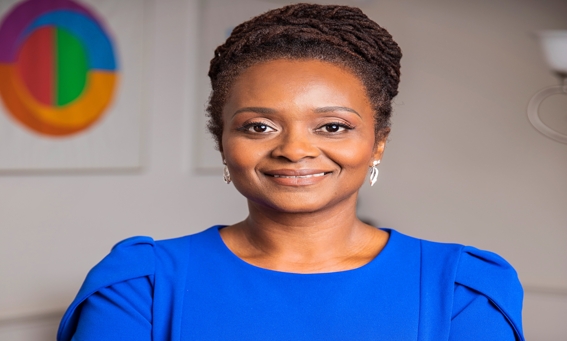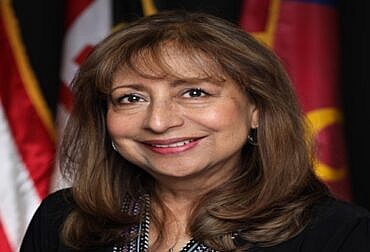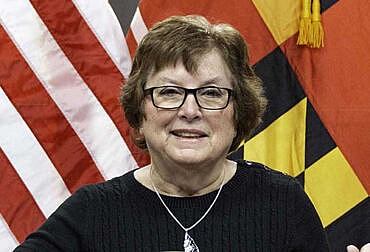Fatmata Barrie is a practicing attorney and community activist. She has over 20 years of experience as a community and civil rights advocate. Fatmata earned her law degree from the University of Florida Levin College of Law and her bachelor’s in psychology from HBCUs Florida Agricultural & Mechanical University. She is the owner of the Barrie Law Center. Fatmata emigrated to the U.S. from Sierra Leone, West Africa at age the age of eleven. Fatmata has received 7 of the 8 endorsements announced to date for the District 5 race: The Apple Ballot (Montgomery County Education Association), Jews United for Justice (JUFJ) Campaign Fund, CASA in Action, Laborer’s International Union of North America (LiUNA), Progressive Maryland, SEIU Local 500, and the Women of Color Coalition. The interview covers topics of economic development, MCPS, healthcare, affordable housing and problems of immigrants.
Nagender Madavaram: Good morning Ms. Barrie. What inspired you to enter into public life?
Fatmata Barrie: Good morning Nagender. I’d give some experiences for inspiration. I came to the US at the age of 11 and since then I’ve been living here. I grew up with my father who was an engineer. My mother worked outside of the home. There are six of us total siblings. Three of us were here growing up together. Three gone back home to Sierra Leone. So, being here as a Black immigrant child, I had to learn to navigate the US system as an immigrant plus as a Black person. I was blessed enough that my parents had us living in communities where I was able to be exposed to all Black communities. I still maintain the immigrant culture within the home. I have been able to do work within any group and any community. I know the struggles that make sure that we attain our legal immigrant status. I think education was key in everything. It was never a question about whether you’re going to college. The question was always what college are you going to? Basically, we all have some sort of higher degree. I saw the struggles of my parents went through. I understood the fact that there were different treatments for me as an immigrant and as a Black person. When I got older, I understood the gender bias.
I have been living here for the past 20 years and fighting and advocating has led me to realize that I have to be inside to be able to make the biggest changes that you want to make. If you are always outside, knocking on the door, they may never open the door for you, so you have to go in there to make the change. That’s why I’m running because I saw the inequities in Montgomery County. I love the county. I love the diversity. I know 1/3 of the population in the county is not born in the US. They are foreign born and you don’t see them in the house of power. You have to be there to make the change and that’s why I’ve been doing what I’ve been doing. I want to represent this district that I love. I work within the party at the state level as chair of the Democratic Leadership Council and the University Leadership Council. I’ve been an ERA coordinator for the Montgomery County Democratic Party for years. So, working within a party, working on the grassroots level has sort of opened my eyes and gives me a huge perspective that I can take to the council.
I am very proud of the endorsements and very humbled. Usually, what that means is people are aware of what you’re doing. They appreciate what you’re doing. It also makes you not want to disappoint them. So, you work even harder because they’re people who have their faith in me. They have given me their faith, trust and belief.
Economic Development:
Nagender Madavaram: Economic development is in your agenda. What is your perspective about the equity?
Fatmata Barrie: In the economic development, there are two things. Yes, there is an inequality. Make that there are equal opportunities to the immigrants as well as other people. In East County, District 5, there is a lot of movement in developing the area. We have the BRT. So, we have all these things that are coming on this side of town. This district is very Black and Brown. There are more Black people in this District probably than any other District. Many of us that live here are immigrants. So, the concern is as jobs come, here are the jobs for those of us who live here. So, the County Council has to ensure that as we approve to develop an area, bring in employers, we make sure that the people who live here are educated and trained for these positions. When they’re paying people for these positions means paying them the proper and livable wages. They’re paying them to the point to where they can for their housing and transportation.
So, when you talk about economic development, you talk about the holistic sense of making sure not just the payment or the training, because if a home is stable economically, that means the children will be more stable, emotionally and mentally. You then can at some point, guarantee safety within people’s homes. So, when we talk about development, we are talking about making sure that everything is ticked off. There’s a domino effect because if your child is stable economically and mentally then they do better in school. If they do better in schools, they’re more likely to be productive citizens. The council should make sure that as the economic developments increase, more funding to the school system. So, we have several schools here that need help. We have schools that have funding for extensions. Some don’t have good learning environment. Children can’t study in harming conditions.
MCPS:
Nagender Madavaram: Schools are administered by the School Board and the County Council’s role is very minimum. How do you bring changes in the schools?
Fatmata Barrie: I would love to see as a Councilmember to have more discussions between the school system and not just the Council but also the Executive’s office. When the decisions are being made about where monies are going, right before the budget is determined, people should have conversation. So that they work together. They will have collaborative conversations and collaborative decisions. Right now, it’s like everyone is in their own silo even though we are all serving the same community, but they’re in silos. You have the County Executive, the County Council and the School Board. They never meet except when they vote on the budget, and then they all go back to their corners. There’s a whole fiscal year of serving the people, so during that year there should be constant dialogue and communication. My grandmother was a teacher. So, I have a real special spot in my heart for teachers and teachers need to be paid good salary. We know that our children spend more time with teachers than with us. During the week, they go to school and they come home. They may have just a couple of hours to eat, do homework and go to bed. So, most of the formative time during the week a child is with a teacher. The teachers who are grooming and forming your child, you want them to be comfortable. You want them to be able to live in the community with your kids so they can understand and relate to your kids instead of living an hour and a half away.
So, providing incentives to teachers for housing and paying good wages can allow them to live in this county. Let’s be real, teachers use their own money for their students. I know many cases where teachers have spent their money to buy food though the salary is not even enough for them to live in the county. When you look at that, why would you not want them to be comfortable where teachers and children can live together in the same community. I am totally in support of making sure that teachers get proper resources they need. I think sometimes we also pray that teachers do some mental health service because during this pandemic we have had to deal with so many problems. Parents have been disgruntled because the way kids are not learning. Even though we all know that the system is not created by the teachers. The system is not run by the teachers but they get the brunt for everything.
Healthcare:
Nagender Madavaram: Covid exposed the weaknesses in the healthcare system. Montgomery County paid special attention and vaccinated people of color. So, what do you think of equity in healthcare?
Fatmata Barrie: I think it was great that we were able to get vaccinated all these communities. My area is one of the most impacted regions in the county. Many of the people who live here work in nursing homes. Thank goodness we eventually put them in a system to get vaccinated. We don’t have easy access to a health clinic over here. There’s a mobile clinic that opens Sundays. We have to, as a county, provide the resources, bring those healthcare benefits to our communities so people can have access to them. If you don’t have health insurance then access to healthcare is impossible. I’ve been there. I’ve had to go to the emergency room and I didn’t have health insurance. It is not fun. It is not good. The bill is ridiculous. You know, there are people who are making $15.00 an hour and $600 a week before taxes. They have to pay the rent. Take care of the kids. God forbid something happens; they have to go to the emergency room. What are you going to do? So, we have to do more.
It was great that the county vaccinated people but there must be a better and permanent system in place. Having access to these resources to receive the services is necessary so that they don’t come out of hospital with a huge bill. They cannot afford because they don’t have high paying jobs on this side of town.
Affordable Housing:
Nagender Madavaram: Recently I discussed with Scott Goldstein, Fire Chief about housing problem of essential workers. He told me that 70% of his workforce in Fire Department is living out of the county. Workers are coming from Pennsylvania and West Virginia to work in the county. How do you solve affordable housing problem?
Fatmata Barrie: I graduated from undergrad program with the psychology. Later, I worked in a residential program. In the 90s, with a bachelor’s degree, I was getting $8.00 an hour, starting off at 7:55 an hour. Housing was not the easiest thing to get and this was in Florida and relatively speaking back then it was cheaper than up here. I couldn’t afford to live in the community that I wanted to live in, especially as a single woman by myself. Looking for safety comfort level. Easy access to the job. So, I started working at a residential program and one of my colleagues was the one that told me of an apartment complex that she was living in. It was allowing people to pay the rent based on their salary. They probably had an incentive from the county or the city. If somebody comes with a higher paycheck then their rent is based on that paycheck. So, because I wasn’t making that much money, my rent was very low. I was able to live peacefully in a nice and safe apartment, not too far from the job. I was able to live the life of a somewhat middle-class person.
I think we can adopt those type of programs. There are lot of programs the county can adopt and tweak them to fit our county. We can do that by making sure that again people are paid a living wage. The median house in Montgomery County right now is about $600,000. They call us low income in East County, but the apartments are like over $1,000 a month. It’s not a low-income community though the housing is not for low income. The groceries are not for low income. When I walk into Giant nowadays and I get a one bag of groceries if I want to eat healthy, not junk or sugary or processed that will cost me over $50. After pandemic, everything’s different. You’re not increasing how much you pay for people. People are still getting low pay but everything else has gone up. How are you going to get proper housing? We have buildings here where you have mold you can smell it and you can taste in the back of your throat. Landlords are not being held accountable. When you have judgments against builders you lower the fines to the point where it’s almost negligible for them anyway. Why would they do anything different than what they’re doing? We should have the same expectations for improper housing as we do in every other part of the country.
Problems of Immigrants:
Nagender Madavaram: You are an immigration attorney as well as first generation immigrant. What are your experiences in this field?
Fatmata Barrie: We have many rules here in the state of Maryland. Part of them allow law enforcement to stop you and ask for your papers or hold you beyond the time that it should hold you. So, we’ve been fighting for a very long time to end it. Many people here in the county who are arrested or detained as immigrants don’t have access to counseling. So, for several years we had the Trust Act. We have a Safe Act at the state level. We try to get it passed here in the Council. So, all this happened over the last few years before I’ve been decided to run for office. So, these were some of the advocacy works that I was doing and testifying in Annapolis. Helping certain groups, write responses to the Attorney General or the government in opposition to what we were requesting. You know, we love our county. We have a progressive county to some degree but we have a hard time in approving things that benefit immigrants. You have a very difficult time.
We fought hard for organizations to get funding to represent immigrants who are detained. People’s reasoning here was we don’t want our county monies to go to criminals or who have been charged with criminal acts. I always say in America we have public defenders for people who have committed crimes, even for terrorists. What is so different except for the fact that these people are immigrants. They’re living in this country and paying taxes. That’s why people don’t realize many of these undocumented immigrants pay taxes. They may not ever get the benefit of those taxes, but they pay the taxes. They have their own businesses. They bring economic standing and economic gains to this country. They don’t get the benefits that everyone else has. So those are the things that I would love to have the opportunity as a Councilmember to push for and educate people because I think a lot of times that’s what missing.
We don’t have people in office who understand this or they have not taken the time to really understand what are the ramifications. We have parents who may not be documented, but they have children who are U.S. citizens. So, when you remove that parent, you now have a child that is homeless. You now have a child that is going into foster care system. When that child feels unstable because ICE can come to the door at any time, you now have a child who is having some mental and emotional issues. The child may not be a productive citizen or resident later. So, there’s a domino effect and we have to think about that. When I was a child, I was technically considered a dreamer. I didn’t come here on my own. My parents brought me here. I got Green Card later almost before going to law school. Anything could have happened during that time. I was just blessed that nothing happened where I could have been tipping our papers were in the process, but it’s technically still undocumented. Look at me now, with God’s Grace, I have a family and a community. I’m an attorney. I have brought so much into my community just as I’ve gotten so much from my community. I want to serve my community on the Council that is why I am running for an office. As a child who came here from West Africa. We were undocumented for a long time. I want to be that person to educate people and be an example of what could be if we look beyond our narrow view.











